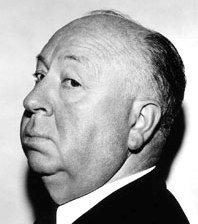Birth : 13 August 1899
Died : 29 April 1980
Nationality :

Comment
ALfred Hitchcock is arguably one of the, if not the, most influencial directors in cinema history. He produced and/or directed several land mark films that changed how films were produced. As a youngster he was living in the east end of London and inspired by the theatre and the new films industry. He joined the film industry in 1919 and he worked with Fritz Lange in Germany in silent films. His first film as a director was The Pleasure Garden, but it was The Lodger in 1927 that was the beginign of his style of film making. Blackmail was the first Britsih sound film to be made. The 39 Steps was the film that really set his style and made is name in Britain in America which he followed up with Lady Vanishes.His las film in England was the disappointing Jamica Inn, but his his film in America was Rebecca dapted from the same author which was his first film with David Seleznick.He said the 1943 film Shadow Of Doubt was his favourite film. For Spellbound he got Salvadore Dali to work on the dream scenes. Rope in 1948 was his firtst colour film and is noted for hislong single takes. In the 1950s he made 3 films with Gace Kelly including Rear Window. In the late 1950s he made was was arguably his best films including 2 with Cary Grant. In Psycho is amde something that was very different athat surprised audiences which moved on with the Birds.
Director
Marnie (1964)
Birds (1963)
Psycho (1960)
North By Northwest (1959)
Vertigo (1958)
To Catch A Thief (1955)
Dial M For Murder (1954)
Rear Window (1954)
Strangers On A Train (1951)
Under Capricorn (1949)
Rope (1948)
Notorious (1946)
Spellbound (1945)
Lifeboat (1944)
Shadow Of Doubt (1943)
Suspicion (1941)
Mr And Mrs Smith (1941)
Rebecca (1940)
Jamaica Inn (1939)
Lady Vanishes (1938)
Young And Innocent (1937)
Sabotage (1936)
Secret Agent (1936)
39 Steps (1935)
The Man Who Knew Too Much (1934)
Waltzes from Vienna (1934)
The Skin Game (1931)
Blackmail (1929)
The Manxman (1929) - Silent
Easy Virtue (1928) - Silent
Lodger (1927) - Silent
The Pleasure Garden (1925) - Silent
Producer
Uncredited on several of the films he directed
Oscars
Nomination - Best Director - Psycho (1960)
Nomination - Best Director - Rear Window (1954)
Nomination - Best Director - Spellbound (1945)
Nomination - Best Director - Lifeboat (1944)
Nomination - Best Director - Rebecca (1940)